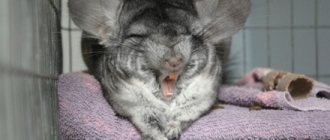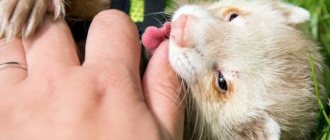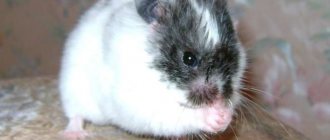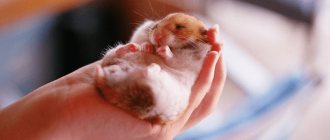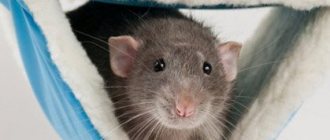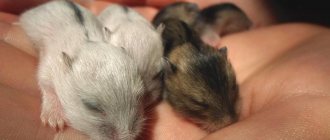The friendliest pet is the ferret. But a wayward animal often picks up upper respiratory tract diseases. It is important for the owner to know what measures need to be taken and how to carry out treatment. If your ferret is coughing and sneezing, you will need to consider the general condition. To determine the exact cause, you should seek the help of a veterinarian.
Bronchitis, cold, runny nose
If your ferret regularly coughs and sneezes, this may be caused by a cold.
As a rule, this is a dry cough, which is replaced by a wet one, as a result of which mucus begins to come out of the nose. In such situations, you must immediately contact a veterinary clinic or begin self-treatment of your pet. To prevent cough and the development of the disease, it is recommended to use Fosprenil and Maksidin; the drugs must be administered intramuscularly. Since the animals are small in size, it is worth taking insulin syringes, so the pain caused will be minor.
These drugs must be administered 3 times daily, using 0.2 ml of the drug. The course of treatment lasts a week. After the pet is back on its feet, many veterinary experts recommend administering 0.1 ml of Gamavit for 30 days. This medicine helps strengthen the ferret's immune system.
If the disease is neglected, it can develop into bronchitis. As a rule, bronchitis most often appears in old ferrets and animals that have problems with internal organs, for example, a weakened heart or lungs. As practice shows, you cannot cure bronchitis at home on your own, as a result of which it is recommended to immediately take your pet to a veterinary clinic.
With a runny nose, the animal begins to sneeze, as the lungs try to push out the bacteria that enter them from the nasal cavity. With an advanced form of a runny nose, the ferret begins to cough, as mucus enters the nasopharynx, as a result of which the animal tries to get rid of the mucus with a strong cough. There may be several causes of the disease: infection in the nasal sinus, the presence of inflammatory processes due to a draft.
As soon as it is noticed that the ferret is breathing heavily, constantly sneezing and coughing, while mucus is secreted from the nose, it is necessary to rinse the nose, having first cleared it. For such purposes, use “Nazivin” or “Naphthyzin” - 0.05% solution. You will need to pour about 0.1 ml of the drug into each nostril.
In addition, if necessary, you can prepare your own solution for rinsing the nose. To do this, you will need to take the following drugs - “Dioxidin”, “Albucid” and “Dexamethasone”, and then mix them in a ratio of 10: 1: 1 ml. It is recommended to administer this solution 2 times daily, using 0.1 ml of the drug per nostril.
Symptoms of tracheitis
It is difficult for a person to determine tracheitis on his own; it is often assumed that there is a problem with the larynx, that is, laryngitis has developed. Usually this is the case, but against the background of laryngitis, it is easy to miss tracheitis of the throat. Therefore, a medical diagnosis is required.
General signs of tracheitis can easily be confused with signs of laryngitis; many of the symptoms are the same2:
- The main symptom of tracheitis in adults is hyperemia of the tracheal mucosa (saturation of blood vessels). The blood vessels dilate and swelling increases.
- A paroxysmal cough occurs, often at night. At the beginning of the disease, the cough is dry, later supplemented by mucopurulent sputum discharge with small blood clots.
- Pain after coughing attacks. The source of pain is either in the larynx or behind the sternum.
- Loss of voice and hoarseness.
- General weakness, malaise and fever.
Ferret sneezes and coughs a lot: reasons, what to do – Fertility
30.05.2019
Pets, like people, can suffer from a variety of diseases. Some are serious, while others go away on their own in a few days. Lizards, fish and amphibians get sick less often, birds more often, but fur-bearing animals can get sick every season, which makes caring for such animals a real challenge.
This applies to those pets that have only recently stopped being wild and are trying to adapt to life in a house or apartment - ferrets. The most common symptom of the disease is cough. So what is wrong with the animal that started sneezing and coughing?
Treating a cold in a ferret
One of the friendliest, most curious and cheerful pets is the ferret.
However, this wayward little one quite often catches diseases of the upper respiratory tract, so it is important for a caring owner to know how to properly treat a cold in a ferret.
The most important thing is that if the disease is infectious, a person can be the carrier. Such diseases are especially dangerous for cubs; it is not easy for their fragile bodies to cope with the disease.
The most susceptible to colds are those pets who participate in exhibitions, as the likelihood of transmitting the virus from animal to animal increases.
It is also important that such events are a lot of stress for the baby and, as a result, a decrease in immunity
Some owners of these animals like to get together for walks and walk their pets. Naturally, these individuals come into contact and can transmit various types of infections to each other.
Signs of a cold
Clear signals of illness in a member of the mustelid family are very similar to the signs of a cold in humans. Namely:
- Ferret sneezes. If he has an upper respiratory tract infection, the duration of the sneezing attacks can be up to 3 minutes. Naturally, this is very exhausting for an animal already exhausted by illness.
- Ferret coughs. The cough is usually hard and dry. Just like sneezing, coughing takes the form of prolonged attacks.
- There is lacrimation, high fever and runny nose. When the animal is healthy, its temperature is in the range of 37.5-39°C. At elevated temperatures, loose stools may appear.
- The baby's activity decreases, he becomes lethargic and lacking initiative. He may have a fever, as a result of which the reaction of all senses is reduced. As a result, the animal may not eat well or refuse to eat at all.
Treatment
An adult and strong representative of this species with strong immunity usually recovers within a week. But this doesn't always happen. If the baby’s appetite does not return and there are no positive improvements in his condition, it is necessary to immediately show the poor fellow to a veterinarian.
How and with what to treat a ferret for a cold:
Antibiotics are one of the most effective prescriptions in the treatment of infectious and viral diseases. This therapy is prescribed exclusively by a veterinarian, and only in cases where previous treatment has failed. Basically, it is prescribed for 2-3 days, after which the animal should recover. If this does not happen, the doctor changes the drug
It is very important to strictly follow the dosage indicated by the veterinarian so as not to inadvertently worsen the condition of an already weak pet. Antibiotics for ferrets are produced in the form of injections, as well as suspensions, which are poured into the pet’s mouth using a syringe without a needle.
It has a pleasant taste and aroma. But injections are more preferable, because suspensions cause gastrointestinal upset. Injections are given in the thigh, having first secured the animal well. In parallel with taking these drugs, the doctor may prescribe immunostimulants. They stimulate the body well to fight the disease. To improve the patient's appetite, rinse your nose a couple of times a day. This way he will smell the food and the recovery process will go faster.
Flu
In addition to humans and pigs, ferrets can also get the flu. Infection can occur through the fault of the owner, since the disease can be easily transmitted from people to ferrets.
Symptoms of the disease: the ferret begins to behave apathetically, he refuses to play and is constantly in a sleepy state. Tear production increases and redness of the skin around the eyes becomes noticeable. Signs of the disease include sneezing, coughing and runny nose. A distinctive feature of the flu from a cold is considered to be a disorder of the gastrointestinal tract. Prolonged diarrhea often accompanies the influenza virus.
Treatment : some animals are able to fight the disease on their own, but only if they have a strong immune system. In other cases, it is better not to risk it and call a veterinarian who will assess the situation and prescribe the necessary treatment (antihistamines and antibacterial drugs). Flu can be treated with derinat; it is a universal remedy for treating ferrets.
Many people ask questions like (tell me which medicine is best to use to prevent the flu?). Most of the answers lean towards the drug Derinat. It has excellent preventive properties against viruses and infections.
Ferret sneezes and coughs: reasons, what to do (treatment)
As with any pet owner, a ferret's cough will make many people very worried.
It's important for you to know that coughing is quite common among them, as it is among other animals.
If your ferret has nasal discharge, consult a doctor immediately
A ferret is sneezing and coughing: is there any reason to panic?
A cough is defined as a strong expulsion of air from the lungs.
REFERENCE! Cough is a reflex activated when an irritant stimulates one or more cough receptors located in the respiratory system, and coughing is the body's natural defense mechanism to protect the respiratory system by clearing it of secretions and irritants.
If your ferret has nasal discharge, take him to the vet as soon as possible. While many ferrets experience nasal discharge due to minor illnesses, it is possible that your ferret may be suffering from something much more serious.
REFERENCE! Mucus, pus, or blood coming out of one or both of your pet's nostrils is called nasal secretions.
The discharge is often accompanied by sneezing, which is an involuntary expulsion of air caused by irritation of the nostrils. This may also be accompanied by gagging, which occurs when the ferret involuntarily tries to remove mucus or other fluids from the upper respiratory tract.
It is also possible that something you are using is irritating or aggravating your pet. Your little friend may be sensitive to a particular product you use, be it dryer sheets or your laundry detergent.
In general, a ferret can sneeze and cough even while washing. There is no need to sound the alarm right away. Just take a closer look at your pet.
You should be wary if the animal starts coughing or sneezing more than 6-7 times in a row. In other cases there is no cause for concern.
A ferret can catch a cold
Prevention measures
To prevent a number of diseases, it is recommended to provide your pet with appropriate living conditions. The ferret must live in cleanliness. The diet should include high-quality food, be complete and varied.
If there are other animals at home that are susceptible to the disease, then it is worth preventing the ferret from coming into contact with them. During periods of illness, it is not recommended to take the animal in your arms; it is worth creating a quiet and calm environment for it.
Do not allow people with a cold or flu near your ferret. If you have a cold, have someone else take care of your ferret until you feel better.
If you must handle the ferret yourself, wear a mask and wash your hands before handling the ferret.
Dust
The most common reason why a ferret coughs and constantly sneezes is simple dust in the room. As practice shows, sneezing is a natural process. For example, at the moment when the animal is washing itself or actively playing, you can hear it quietly sneezing or coughing. You shouldn’t sound the alarm right away; first of all, you need to take a closer look at how the animal behaves, whether it has lost its appetite, whether it is also active, how often it sneezes and coughs. It is important to understand that not every sneeze is a sign that your ferret has a cold. You should be wary at the moment when he sneezes or coughs more than 7 times in a row. In all other cases there is no cause for concern.
Worms and cough
Often these worms are nematodes. They parasitize the respiratory tract of the ferret. The lungs, reacting to the pathogen, reflexively try to throw out the parasites, which is accompanied by a strong cough. Worms can cause your pet to lose appetite and become lethargic. Such aspects will quickly lead to the death of the animal.
The first signs of nematodes are severe coughing and shortness of breath of the animal, even when it is not moving. In the later stages, the temperature rises and mucous discharge appears during coughing. The symptoms are very similar to a cold, and therefore the help of a veterinarian is required.
The note! Worms can be noticed in the early stages. The consistency of the excrement changes greatly, the stool becomes liquid and has a strong unpleasant odor. Parasites are often found in such stool.
Fertets are treated with ordinary anthelmintics for cats. There are countless such drugs on the market, but their dosage must be selected by a veterinarian. Usually this is Dirofen paste, Milbemax or Prazitel (in the form of a suspension). The dosage of the drug is determined according to the instructions for kittens attached to the drug. After a certain period (10-12 days), deworming is carried out again.
Important! Treat for worms after purchasing a ferret. Such Diagnostics will allow us to develop some protective functions of the immune system, which will prevent future infections with worms.
These are the main causes of coughing in ferrets, but now you know how to treat this symptom and what ailments it is accompanied by.
Diagnosis of tracheitis
In addition to the standard history taking, external examination, assessment of respiratory function, initial examination of the throat and auscultation using a phonendoscope, there are laboratory and instrumental diagnostic methods, as well as additional studies that can lead the doctor to tracheitis4. It is on the basis of diagnosis that the causes of tracheitis and methods of its treatment are determined.
- General and biochemical blood test. The simplest test to distinguish between viral and bacterial infections (based on C-reactive protein and other indicators)
- X-ray or radiography. The most common and familiar way to check the chest. The picture can be taken in front or side projections. The image clearly shows the lungs and trachea. Thanks to x-rays, it becomes much easier to identify signs of tracheitis and distinguish it from bronchitis or pneumonia.
- Taking and examining smears. A standard procedure in which the doctor uses a sterile cotton swab to take a swab from the mouth. Next, the material is sent to the laboratory, where all the necessary studies are carried out, identifying the pathogen and its sensitivity to antibiotics.
- Laryngotracheoscopy. The endoscope comes into play. This study is the most informative. A special tube with a camera is inserted into the larynx and trachea, thereby the doctor can visually identify characteristic features, swelling, redness, etc. and possible causes of the disease (with a viral infection there are specific changes in the organ). If the study involves the bronchi, the procedure is called tracheobronchoscopy.
- Taking sputum for analysis. In this case, the sputum of a sick person is collected and sent for bacteriological examination (microbiological examination). This procedure is used for a more comprehensive diagnosis of chronic cough to exclude other bacterial diseases (tuberculosis).
- Pharyngoscopy. The standard method is for the doctor to examine the throat using a spatula. First of all, pharyngitis is diagnosed, which makes it clear about the possible development of tracheitis.
- Rhinoscopy. The procedure is an examination of the nasal cavity. For this, an optical device is used - a rhinoscope. Rhinitis is detected as a consequence of a respiratory infection, which means progression of tracheitis is possible.
- X-ray of the sinuses. X-ray, images of which will determine the presence of sinusitis or sinusitis if they are suspected. The progression of the disease may also affect the development of inflammation in the trachea.
- Allergy tests. In rare cases, tracheitis occurs due to an allergic reaction. Allergy tests allow you to determine which allergens your body responds to. Various substances are applied to the skin; if a reaction occurs in the form of redness, itching or swelling, then the allergen has been identified.
In addition to the help of a therapist and otolaryngologist (ENT), to determine the causes and make a diagnosis, consultations with doctors such as an allergist, pulmonologist and even a phthisiatrician may be required.
The ferret is choking!
Yesterday my baby was very ill (she ran around the room all evening, sorted through her toys, put them in bags, hid them in other places, well, in general, she was a normal and cheerful ferret) and when I put her in the cage, she began to behave as if she was choking and would not be able to clear her throat, she was breathing heavily, choking, hiding in the corners of the cage, from time to time she coughed and coughed, but could not clear her throat, she got scared and scared me! This state lasted about ten minutes, but then she seemed to feel better, and she went to eat) they called the breeder, she said that there was either something stuck in her throat or a blockage, but there couldn’t be a blockage, because she goes to the toilet normally. Today she is cheerful and cheerful again) this happened last week, but also not for long, and a couple of days ago, when she choked on dry food, she behaved the same way. she has a toy, a fur tail (women and girls have the kind on their phones and bags), she loves to play with it, maybe she swallowed a hair from this tail? I’m very worried about her, I’m afraid that this will happen again, this I have my first ferret and she has only been living with me for 2 months, I am very worried about her! What could cause this? and should I see a doctor?
| 0#March 17, 2012 at 8:010 pm |
If I were you, I would have already been to the doctor... After all, if this happens after outdoor games, then perhaps the heart is playing pranks... Of course, only a recommended veterinarian can give you a diagnosis and recommendations after examining the chori... maybe, you know, anything! and if this condition recurs, then you should consult a specialist. Who did you take the choir from?
| 0#March 21, 2012 at 00:390 |
Of course it's better to see a doctor! But since this is the molting period, I can assume that she swallowed some fur. There is a special paste, sold in any pet store, that removes fur. You can buy cat food, ferrets love to eat it. Give about a centimeter a day. Don’t get sick
